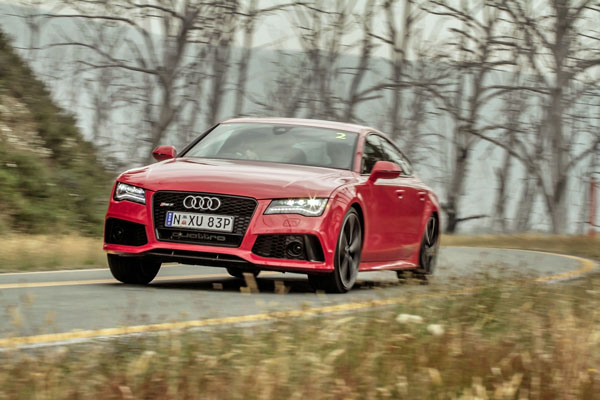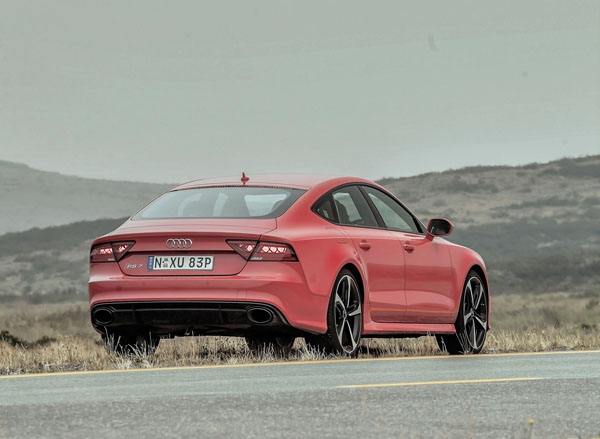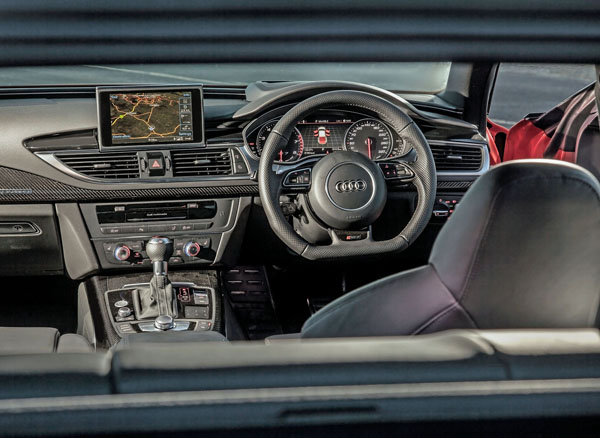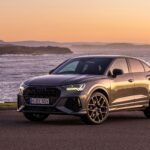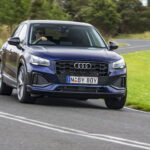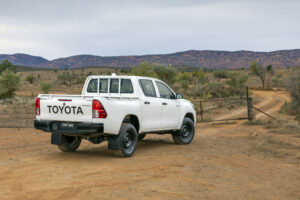Ingolstadt’s big fast cars don’t make headlines the way their BMW and Mercedes counterparts do. We’re not entirely sure why because Audi’s RS6 and RS7 are two of the most capable cars on the planet.
Following a trip around Philip Island in the RS7 where its abilities were worked hard, we borrowed the keys for a week to live with the big coupe on the road.
VALUE
The Audi-RS7 kicks off at a stout $241,610, an increase of $12,500 over the Avant-only (station wagon) RS6.
Your money buys you a full leather interior, 14-speaker stereo, power everything, four-zone climate control, funky LED interior and exterior lighting, rear-vision and all-around camera with parking sensors front and rear, carbon fibre trim inserts, active cruise control, auto headlights and wipers, heated front seats, heads-up display, keyless entry and start, auto parking, DAB+ digital radio, sunroof and air suspension.
Our test car had the optional 19-speaker B&O stereo with wacky UFO-like tweeters that rise out of the dash on startup ($12,000), Dynamic Package plus which adds electronic dampers but dumps the heavy air suspension while bolting on gigantic carbon ceramic brakes ($25,840) and the Matte Daytona paint ($12,040).
DESIGN
Despite advancing towards retirement, the RS7 is still a fine looking car. Drawing heavily on the four-door coupe lines of its smaller brother the A5, the extra length sits well on the long wheelbase, helped by a lower roofline than the A6 donor car. It looks a bit depressed from the rear but tremendous in profile.
Extra RS agro in the form of big wheels, deep skirts and bumpers and on our car, matte gunmetal paint give the svelte machine a more menacing stance than the lesser A7.
Added to that the blacked-out grille and optional LED matrix headlights, the RS7 is distinct from the base car while still not shouting too loudly, with subtle RS badging front and rear.
Inside is the roughly the same as the A6 / RS6 pair up front, with some minor updates to include a better motorised pop-out screen, full colour screen between the (large) tacho and speedo and plenty of buttons to control the various in-cabin systems.
Headroom in the rear is predictably tight but there’s enough lounging space for six footers with short torsos. It feels a lot more snug, especially if you opt for the no-cost option RS seats in the rear.
The boot is big at 535 litres (just 30 short of the RS6 wagon’s boot), deep and rectangular with plenty of space for your luggage although you won’t be carrying a full complement of five suitcases.
SAFETY
Eight airbags, ABS, brake assist and force distribution, stability and traction controls feature as standard.
The Audi RS7 also features lane departure warning, autonomous emergency braking, forward and rear collision mitigation and the adaptive cruise control can brake the car to a stop then resume once the car in front pulls away.
INFOTAINMENT
Our test car’s $12,000 B&O stereo was not only great to listen to, it is – amusingly – fun to look at. When you start the car, two speakers rise out of the dash to welcome you before giving you the opportunity to make your ears bleed via 19-speakers. It’s impressive.
The stereo is run by Audi’s MMI rotary-dial controlled system, with this mild refresh receiving Audi’s MIB2 update for the screen giving you more colours and pixels while letting you store 4000(!) phone contacts. There’s also DAB+ radio, DVD and USB port.
The sat-nav is well-detailed and has detailed live traffic functionality and you can put a SIM card in the car for Google maps overlays.
ENGINE / TRANSMISSION
Audi RS7 is powered by a stonking twin-turbo 4.0-litre 90-degree V8. At 6600 rpm you’ll find 412 kW, between 1750 and 5500 rpm there’s a whopping 700 Nm.
Naturally, all of this power reaches the road via four wheels, there’s an eight-speed ZF automatic transmission. Plant your foot and the RS7 will jump to 100 km/h in 3.9 seconds.
Audi claims 9.5L/100km on the combined cycle but that is, of course, ridiculous. After a fairly arduous and enjoyable week in our hands, the RS7 used 13.7L/100km, which is still impressive going for a heavy all-wheel-drive car. This figure is helped along by regenerative braking, stop-start and cylinder-on-demand technology.
DRIVING
Audi’s RS7 is an immense amount of fun. A mix of excellent grip, accessible power and an exhaust that sounds a lot like its Italian cousin, the Lamborghini Huracan all adds up to a fantastic road-going sportscar.
The engine is brilliant – free-revving, characterful and hugely flexible once on boost, which isn’t hard, especially in Dynamic mode. The only thing better than the engine are the carbon ceramic brake package. Colossally capable on track, they’re amazing on the road because they mix that unflappable repeated hard-stop performance with steel-like feel, something no car so-equipped had just a few short years ago.
It’s a totally fuss-free performance car when you’re behind the wheel. The steering is bang-on for weight and has enough feel to let you know what’s going on. While the front wheels work hard driving and steering, understeer is limited by torque vectoring and rearward bias for the power delivery. A BMW or Merc will edge it on the track without a great deal of difficulty but that doesn’t mean much when you hit the road.
The stiffer sprung dynamic pack is definitely worth the lower weight as the car is just that bit more responsive to changes of direction. Having said that, in comfort mode, it could be a 2.0 TDi, it’s incredibly docile and particularly easy to live with. An BMW M6 Gran Coupe can’t match it for price, ease of use or every day practicality.
SUMMING UP 4.0/5
Fast Audis are an eclectic lot – the SQ5, the RSQ3, the RS4, 5 and 6 are niche cars – wagons, four-door coupes or unlikely SUVs. The RS7 puts it all together with the looks and the awesome dynamics to put it in another league while still maintaining a roomy and comfortable interior.
Out of the big German coupes, this is by far the most fun and from almost every perspective, the one to own. It’s not as capable on the track but it’s way more fun on the road because you’re far less likely to be spat off it.
Likes: crackly exhaust, surprisingly practical (and beautiful) cabin, wonderful usability
Dislikes: tyre noise from the front, could do with a weight loss program, cost of dynamic package.




